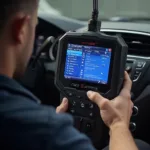Have you ever encountered the dreaded check engine light on your dashboard, only to find out it’s accompanied by the cryptic OBD2 code B0608? This code can be a cause for concern, but understanding its meaning and potential causes can help you address the issue effectively.
Decoding the OBD2 Code B0608
In the world of automotive diagnostics, the OBD2 code B0608 signifies a problem within the Electronic Control Unit (ECU), specifically related to the internal control module monitoring processors. This code indicates a malfunction in the communication or operation of these processors, which are essential for managing various vehicle functions.
Common Causes of OBD2 Code B0608
While the appearance of the B0608 code points to an issue with the ECU, pinpointing the exact cause often requires further investigation. Here are some of the most common culprits behind this OBD2 code:
-
Faulty ECU: One possibility, albeit less frequent, is a malfunctioning ECU itself. Over time, components within the ECU can degrade or fail, leading to communication errors and triggering the B0608 code.
-
Wiring Issues: The ECU relies heavily on a network of wires and connectors to communicate with various sensors and components throughout the vehicle. Damaged, corroded, or loose wiring can disrupt these communication channels, resulting in the B0608 code.
-
Software Glitches: Like any computer system, the ECU operates based on software instructions. Software bugs or corruption can interfere with its normal functioning and trigger the B0608 code.
-
Voltage Fluctuations: The ECU needs a stable voltage supply to operate correctly. Significant voltage spikes or drops, perhaps due to a failing alternator or battery, can disrupt the ECU’s operation and trigger the code.
Diagnosing and Resolving the B0608 Code
When faced with an OBD2 code B0608, it’s crucial to approach the diagnosis systematically to ensure you address the root cause effectively.
-
Read and Clear Codes: Begin by using an OBD2 scanner to read the codes stored in your vehicle’s computer. After noting all codes, clear them and see if the B0608 code returns.
-
Visual Inspection: Conduct a thorough visual inspection of the ECU’s wiring harness and connectors. Look for any signs of damage, corrosion, loose connections, or exposed wires.
-
Software Update: Check if there are any software updates available for your vehicle’s ECU. Software updates often address known bugs and improve the ECU’s overall performance.
-
Voltage Check: Using a multimeter, check the battery voltage and the charging system’s output to ensure the ECU receives a stable and adequate voltage supply.
-
Professional Assistance: If the issue persists after these steps, it’s best to seek assistance from a qualified mechanic specializing in automotive diagnostics and ECU repairs.
Preventing Future Occurrences of B0608
While not all causes of the B0608 code are preventable, some proactive measures can help minimize the chances of encountering this issue:
-
Regular Vehicle Maintenance: Following your vehicle’s recommended maintenance schedule, including inspections of the electrical system, can help detect potential problems early on.
-
Quality Battery and Alternator: Ensure your battery and alternator are in good working condition to maintain a stable voltage supply to the ECU.
-
Protect Your ECU: Be cautious when working near the ECU or its wiring to avoid accidental damage. If you’re performing electrical work on your vehicle, disconnect the battery’s negative terminal as a precaution.
The Importance of Addressing OBD2 Codes Promptly
Ignoring any check engine light, including one accompanied by the OBD2 code B0608, can have significant consequences.
Here’s why:
-
Further Damage: Ignoring the underlying issue can lead to further damage to the ECU or other related components, potentially resulting in costlier repairs down the line.
-
Performance Issues: A malfunctioning ECU can affect various vehicle functions, leading to reduced engine performance, decreased fuel efficiency, and even safety concerns.
-
Emissions Failure: In some cases, an unresolved ECU issue can prevent your vehicle from passing emissions tests.
Conclusion
The OBD2 code B0608, while potentially concerning, is not an insurmountable challenge. By understanding its implications, common causes, and diagnostic steps, you can take the necessary measures to address the issue effectively. Remember, timely action and seeking professional help when needed can save you from more significant headaches and repair costs down the road.
Need help finding the right OBD2 scanner for your needs? Check out our recommendations for the best bluetooth obd2 amazon.
